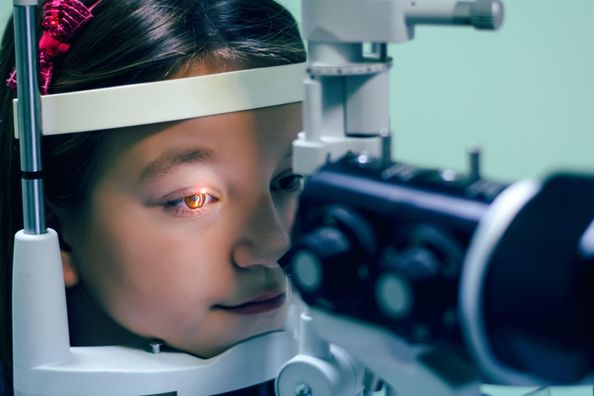From completing school and sports physicals to supply shopping and establishing an earlier sleep schedule, the back-to-school transition can feel overwhelming. Stress can have a negative impact on your health, so it’s important to take steps to minimize any anxiety you and your family may be experiencing as you prepare for your new routine. Our team of experts share back-to-school exams your child may need and ways you can prepare to keep your child mentally and physically healthy.
To address any physical concerns, or depending on their age, your child may need a variety of exams before heading back to school, including:
A physical exam
During a physical exam, your pediatrician will assess your child’s current health, any chronic medical conditions including allergies, asthma, weight and nutrition, their activity level and address any attention or behavioral issues that you share.
Your pediatrician will also review all recommended vaccines with you during the appointment.
Certain extracurricular activities may also require a sport physical, an additional exam that ensures your child is healthy enough to engage in more strenuous physical activity.
If your child is going into preschool, kindergarten, sixth grade, ninth grade, a new school district, or plays sports, schedule a school or sports physical with a Duly Pediatrician today.
An allergy or asthma assessment
If your child suffers from allergies or asthma, you should meet with an allergist yearly to develop an action plan and to make necessary adjustments to medication dosage as your child grows.
This detailed health plan provides valuable information about your child’s asthma and/or allergens and outlines what actions and emergency medications need to be taken in the event of an allergic reaction or asthma attack.
Allergist, Melissa Robinson, DO, encourages parents to talk with their child and to meet with their teachers to ensure everyone understands their child’s specific action plan. This conversation should include ways to minimize risk of an allergy exposure or asthma attack, including frequent hand washing and avoiding sharing snacks.
Be sure to check the expiration dates on epinephrine auto injectors and albuterol inhalers before providing them to your child’s school.
An eye exam
Eye exams are not just about vision. Completing a dilated eye exam can provide valuable information about the health of your child’s eyes and how their eyes work together. A child may have 20/20 vision, but if their eyes are not working together, it can cause a variety of symptoms, including double vision, eye strain or headaches. This can make nearsighted activities like reading, comprehension and writing more difficult.
Pediatric Ophthalmologist Andrew Jilwan, MD, recommends that children without eye or vision problems receive an eye exam at least every two years to monitor for changes, while those with glasses or corrective lenses should be seen every year.
If your child is heading into kindergarten, second, or eighth grade, schedule an eye exam with a Duly Pediatric Ophthalmologist online.
A skin exam
Acne and other skin-related concerns may make your teen feel self-conscious or anxious about heading back to school. Establishing a daily skin care routine before the school year starts can help keep acne-prone skin looking its best.
Dermatologist, Ashley Feneran, DO, recommends washing your face twice daily (in the morning and evening) with a gentle cleanser, avoiding rough or abrasive products and applying sunscreen daily, as excessive sun exposure can cause acne to flare-up.
Over-the-counter products, including oil-free or non-comedogenic facial moisturizers and products containing salicylic acid and benzoyl peroxide, can help reduce breakouts.
For more persistent acne, schedule an appointment with a dermatologist to discuss additional treatment options, such as prescribed topical medications.
It can take about a month for acne products to produce results, so you should establish a skin care routine several weeks before heading back to class.
In addition to completing physical examinations, it is important to address other factors that may impact your child’s health, including:
Establishing healthy sleep habits
Ensuring your child gets enough sleep is essential to their overall health. Most kids need between nine and ten hours of sleep each night. Start preparing your child for their new schedule two weeks ahead of time by gradually shifting their evening and morning routines. In addition to going to bed earlier, our pediatricians recommend turning off all electronic devices one hour before bedtime to help your child prepare for a restful night of sleep.
Check their bag
An overfilled, heavy backpack can cause poor posture in addition to back and/or neck pain. Physical Therapist, Elizabeth Rodgers, PT, DPT, OCS, shares how you can avoid backpack-related pain by:
Checking the fit: Your child should always wear their bag on both shoulders to prevent imbalance. Choose bags with shoulder straps that are padded and adjustable. Backpacks should run from shoulder height to about two inches past the waistline.
Checking the weight: The American Physical Therapy Association recommends that backpacks remain less than 10 – 15 percent of your child’s body weight. You can perform a quick weight check by attempting to lift the bag yourself and removing any unnecessary items.
Practicing proper packing techniques: When packing a backpack, always place heavy items at the bottom of the bag. Bags that have multiple compartments can help distribute the weight more evenly.
Watch for signs of stress
Children and teens can be sensitive to stress and anxiety, especially when starting at a new school. Gastroenterologist, Richard Song, MD, recommends monitoring your child for signs of anxiety or stress. For many children, anything that is out of their daily routine, even if it is exciting and positive, can trigger stomach upset, due to the complex interaction between the neurons in your brain and gut. In addition to stomach upset, watch for changes in mood or behavior, including tantrums or social withdrawal.
To help your child feel more prepared for the transition, arrange playdates with classmates throughout the summer to help develop friendships that will make starting school less scary and more fun. Pediatrician Debra Schwartzers, MD, also recommends keeping your child active, as regular exercise and a healthy diet can provide stress relief and keep your child feeling their best.
Planning ahead, whether it’s scheduling your child’s physical exams or introducing a new sleep schedule, can make a big difference in your family’s back-to-school transition. Schedule a school or sports physical today!
Health Topics:







